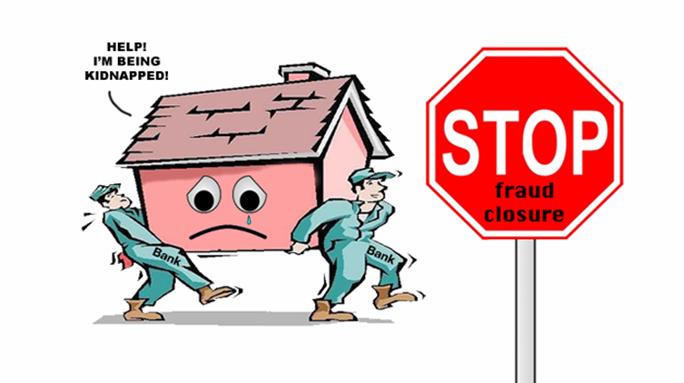The Market Ticker – Housing Fraud Cheered At The WSJ
There comes a point where cheerleading for crooks has reached the level of the absurd.
One reason for optimism in the New Year is the housing market, which continues to heal despite the weak economic recovery. Case-Shiller, Lender Processing Services and other data trackers are reporting recoveries in many regions. Even more noteworthy is that the rebound is strongest in states that let lenders enforce contracts.
We’re referring to the difference between “nonjudicial” states that have streamlined foreclosure procedures and the 23 “judicial” states that force lenders to go to court to enforce mortgage contracts. Prices are stabilizing in the former but still faltering in much of the latter, which isn’t surprising, except to politicians. Housing markets can’t clear until lenders can foreclose on delinquent borrowers and prices fall far enough to attract buyers who can afford the mortgage payments.
That’s because in judicial states, which the lenders knew were judicial states when they made the loans, they can’t generally prove up their claims in a lawful sense — so they manufacture documents they don’t have (on purpose) and then hope nobody looks too closely (or their opponent doesn’t even show up!)
The Journal goes on to “decry” that these states take longer and people can live in the house without paying. But certainly this risk was known to the lender, with superior information and experience, at the time they made the loan, yes?
So where’s the beef?
Look, if the lenders had their paperwork in order because they didn’t shred or lose it in the first place, and could actually show up with a nice documentary trail showing every assignment, that they hadn’t been paid off by some other instrument or game they played, and that in fact the alleged trust they’re suing in the name of actually has the paper in question these cases would go pretty quickly — and there would no big backlog.
But they didn’t do that.
They could have also made prudent loans in the first place, instead of writing not one but two mortgages on two properties for over $1m each to someone with $100k of income. Yes, that happened around here in Florida, more than once, and then the banks are surprised when the borrower can’t pay?
Was that an actual loan or was it some sort of scam where they found a rube to pass the paper on to at par (and then lost it on top of it!), played “pinky promise” and then when the expected default occurs they cry poverty and “injustice”?
Hmmmm…
I say that those who pulled some hinky crap shouldn’t get rewarded for it. The putative homeowner who “bought” a house they can’t afford shouldn’t get to keep it. But the putative “lender” who didn’t really loan anything as he had a buyer for the paper all lined up and then intentionally failed to properly transfer and record everything like he was supposed to shouldn’t profit from this bogus deal either nor should he be able to abuse the courts, committing unbridled and outrageous acts of perjury.
Further, if said bankster shows up to sue for foreclosure he should have to prove up his case like anyone else, complete with full proof of standing including the original paperwork with all transfers documenting that it was assigned as required by law into the alleged putative trust that claimed to be holding it at the time of default!
If they can’t do that then the court is simply rubber-stamping frauds that are now being whitewashed in the name of “expedience.” And the reason we’re seeing such a big backlog here in Florida is that these institutions come into court with intentionally incomplete paperwork, knowing damn well they can’t prove up their case, and hope for a Judge who’s got vodka in his water glass on the bench.
The problem isn’t judicial foreclosure.
It’s that there’s so much damned fraud that neither side deserves to have any of their prayers for relief heard, and neither deserves to “win.”
When you ask Judges to play Solomon it takes time, but the entire responsibility for this state of affairs lies with the banks — not the borrowers.
~


They are all sadistic crooks.
The article is useful in clearly seeing how certain members of our society view so-called contract law. In a way they are right, if you indemnify predation, contract law becomes a fantastic weapon. Far more effective than guns and tanks, The same process is used to make people slaves in both the real and imaginary sense. Power will quickly discredit this parallel, they’ll tell us there is no obvious blood, and people aren’t being beaten to death. But debt can be just as efficient, without firing guns or whipping people. But people commit suicide, and they are destroyed to destitution, some will carry scars for life. Most importantly, housing is never valued correctly by our Kings of Finance. In other words, water will be kept away from those who are dying of thirst, and this will be called legal and profitable.
You hit the nail on the head, whoever (author) you are! The only shit that is believed in what the WSJ writes and publishes are the crooks themselves! Anyone with a workable brain should just skip over or file it in File #13.